Select Language
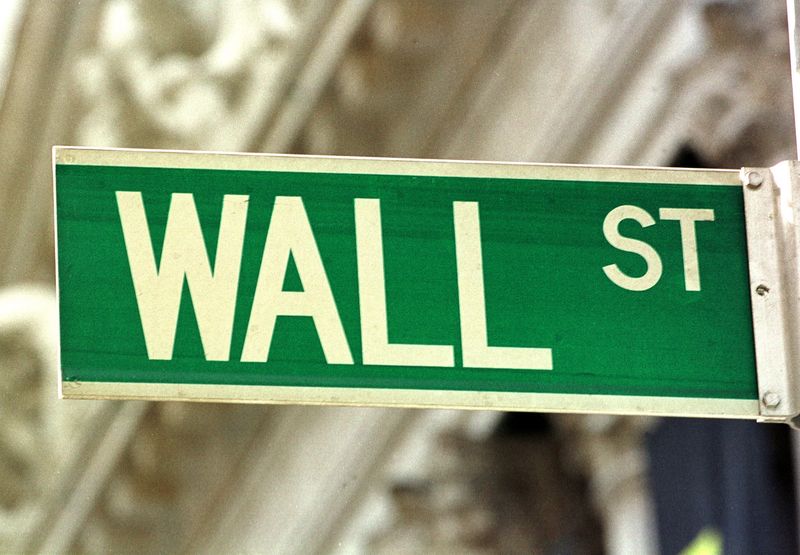
Investing.com-- U.S. stock index futures rose slightly on Tuesday evening as caution grew ahead of key consumer inflation data that is likely to factor into the Federal Reserve’s outlook on interest rates.
Futures were muted after a choppy session on Wall Street, as softer than expected producer inflation data provided only limited relief over a hawkish outlook for interest rates.
Investors were also cautious before a string of major bank earnings on Wednesday.
S&P 500 Futures rose 0.1% to 5,886.25 points, while Nasdaq 100 Futures rose 0.1% to 20,949.50 points by 18:38 ET (23:38 GMT). Dow Jones Futures rose 0.1% to 42,792.0 points.
Among individual movers, Tesla Inc (NASDAQ:TSLA) fell 0.4% after the Securities and Exchange Commission sued CEO Elon Musk for failing to disclose a substantial stake in Twitter during his purchase of the social media firm.
CPI data awaited for more rate cues
Focus was now squarely on upcoming consumer price index inflation data, which is expected to provide more insight into the Fed’s plans for interest rates.
The reading is due at 08:30 ET (13:30 GMT), and is widely expected to show inflation remained sticky in December.
Sticky inflation gives the Fed less impetus to cut interest rates, with the bank having warned as much during its December meeting.
Markets are positioning for a much slower pace of interest rate cuts in 2025- a trend that could bode poorly for risk-driven assets. Wall Street indexes had slumped through late-2024 on this notion.
PPI data offers limited relief
Producer price index inflation data released on Tuesday read softer than expected for December. But the print provided little relief to markets, given that some measures of inflation, which also factor into PCE price index data, remained high. PCE data is the Fed’s preferred inflation gauge, and is due later in the month.
On the inflation front, markets were also on edge over incoming President Donald Trump, who will take office from January 20. Fed officials recently expressed concerns that Trump’s plans for hefty trade tariffs will underpin inflation, keeping rates higher in the long term.
A Bloomberg report showed this week that Trump’s team was also considering a more staggered approach to tariffs.
Wall St nurses weak start to 2025; earnings awaited
Wall Street indexes marked a chippy session on Tuesday amid persistent weakness in technology stocks. They were also nursing a weak start to the year after tumbling from record highs through December.
The S&P 500 rose 0.1% to 5,842.86 points on Tuesday, while the NASDAQ Composite fell 0.2% to 19,044.39 points. The Dow Jones Industrial Average rose 0.5% to 42,518.28 points.
Focus this week is also on a string of key bank earnings. Prints from JPMorgan Chase & Co (NYSE:JPM), Wells Fargo & Company (NYSE:WFC), Goldman Sachs Group Inc (NYSE:GS), and Citigroup Inc (NYSE:C) are due on Wednesday.
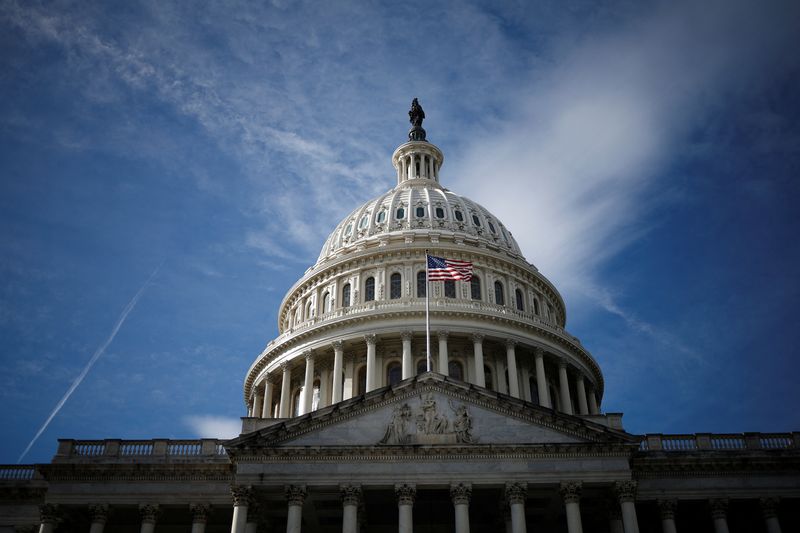
WASHINGTON (Reuters) - The U.S. government posted an $87 billion budget deficit in December, reduced partly by a shift of benefit payments into November but capping a record $711 billion deficit for the first three months of the 2025 fiscal year, the U.S. Treasury Department said on Tuesday.
The Treasury, releasing its final budget report before President-elect Donald Trump takes office next week, said that the $711 billion October-December deficit was $201 billion, or 39% higher, than the $510 billion deficit in the same period a year earlier as outlays grew sharply and revenues declined slightly.
For December, the $87 billion deficit was reduced by $51 billion by the calendar benefit shift, and compared to a $129 billion deficit in December 2023. Receipts for the month were up 6% to $454 billion, while outlays as reported were down 3% to $541 billion.
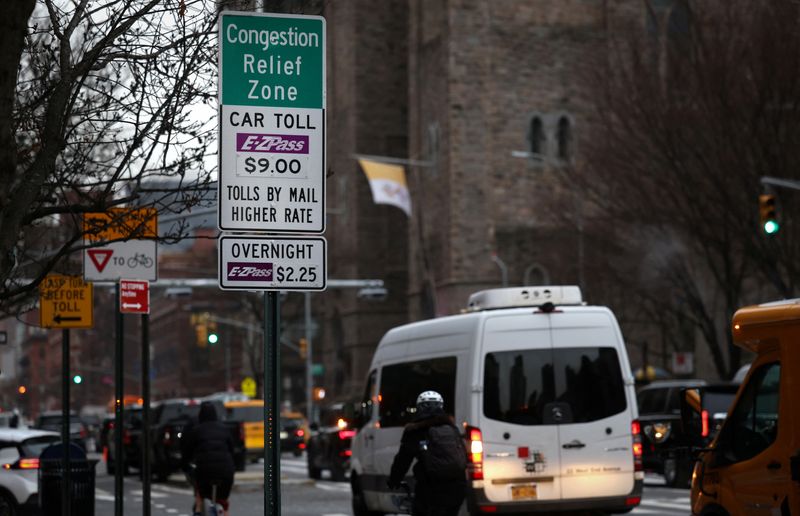
By David Shepardson
WASHINGTON (Reuters) -Traffic in Manhattan's central business district fell by 7.5% last week and 273,000 fewer cars entered the borough's central business district after the first congestion pricing fee in the U.S. took effect on Jan. 5, New York City transit officials said on Monday.
The fee is designed to reduce traffic and raise billions for mass transit, with most of the revenue generated targeted to upgrade the city's subway and bus systems.
"The early data backs up what New Yorkers have been telling us all week – traffic is down, the streets feel safer, and buses are moving faster," said Janno Lieber, head of the Metropolitan Transportation Authority. Overall travel times are 30-40% faster on inbound river crossings into Manhattan, which has the most congested traffic in the United States.
Under the program, passenger vehicles are charged $9 during peak periods in Manhattan south of 60th Street. Trucks and buses pay up to $21.60. The fee is reduced by 75% at night.
The fee went into effect after neighboring New Jersey failed to convince a judge to halt it. The city rushed to implement the charge before President-elect Donald Trump's inauguration on Jan. 20. Trump, who has a Manhattan residence, opposes the fee and said he would seek to block it.
The MTA said less traffic means faster bus speeds, especially in the morning peak period.
Charged via electronic license plate readers, private cars pay once a day regardless of how many trips they make into the central business district. Taxis pay 75 cents per trip and ride-share vehicles reserved by apps like Uber (NYSE:UBER) and Lyft (NASDAQ:LYFT) pay $1.50 per trip.
A few other cities around the world already have congestion pricing systems. London, which implemented its system in 2003, now charges 15 pounds ($18.33). Singapore and Sweden also have congestion pricing plans.
The MTA has said the program will eventually result in 80,000 fewer cars a day, about an 11% reduction. Before the fee, the MTA said more than 700,000 vehicles entered the Manhattan central business district daily, slowing traffic to around 7 mph (11 kph) on average, which is 23% slower than in 2010.
The city estimates the congestion charge will bring in $500 million in its first year. New York Governor Kathy Hochul said the money would underpin $15 billion in debt financing for mass transit capital improvements, with 80% of the money to be spent on the subway and bus system, and the other 20% spent on the MTA's two commuter rail systems.
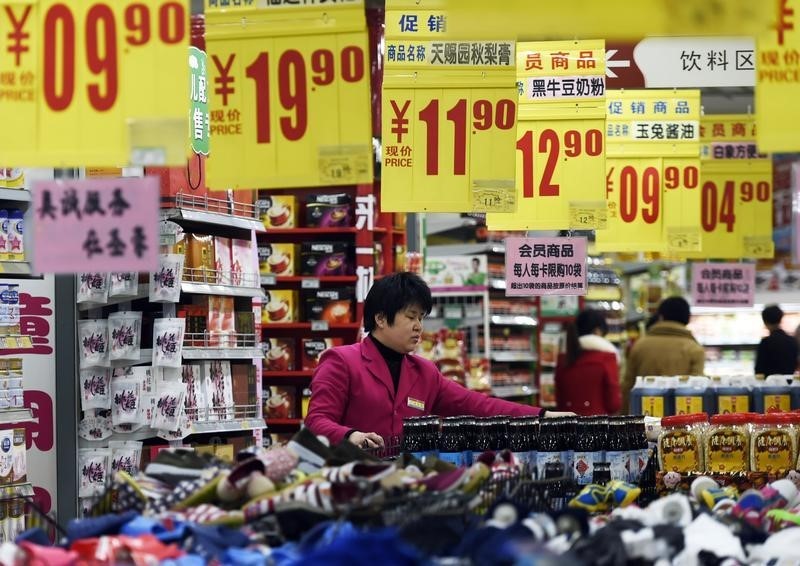
Investing.com-- China’s economic growth is expected to slow to 4.0% in 2025 as it contends with potential US tariff hikes and ongoing property sector challenges, according to a UBS research note.
The tariffs, anticipated to be announced in the first quarter and implemented in stages starting in the third quarter, are projected to reduce China’s GDP growth by over 150 basis points through weaker exports and manufacturing investment, UBS analysts said in a note.
While the property sector remains under pressure, UBS forecasts smaller declines in sales and investments compared to previous years.
Recent policy easing, including mortgage rate cuts and urban renovation initiatives, has shown some effect, particularly in major cities. However, elevated inventory levels and tepid household sentiment continue to weigh on the market, with nationwide stabilization not expected until 2026, analysts wrote.
In response to these challenges, UBS anticipates increased fiscal and monetary policy support. The government is likely to announce measures during the March National People’s Congress meeting, including a higher fiscal deficit target of around 4% of GDP and the issuance of special government bonds.
UBS also expects a policy rate cut of 30–40 basis points in 2025 and further easing in 2026.
Lingering deflationary pressures, with core consumer inflation hovering around 0%, add to the economic concerns. The renminbi is expected to depreciate modestly to 7.6 against the U.S. dollar by the end of 2025 due to tariff impacts and a wide U.S.-China yield spread, according to UBS.
UBS highlights the potential for surprises, including stronger-than-expected U.S. economic growth or a faster property market recovery, which could alter China’s outlook. However, uncertainties surrounding global trade and domestic policy effectiveness remain significant hurdles for sustained growth.
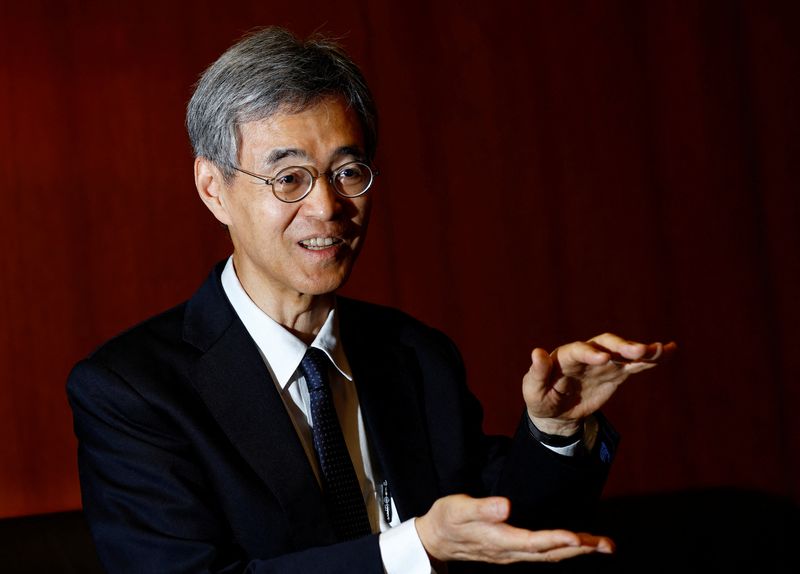
By Leika Kihara
YOKOHAMA (Reuters) -The Bank of Japan will debate whether to raise interest rates next week, as prospects of sustained wage gains heighten and the U.S. policy outlook becomes clearer in President-elect Donald Trump's inaugural address, Deputy Governor Ryozo Himino said.
In a speech to business leaders in the city of Yokohama, Himino said on Tuesday it would "not be normal" for real interest rates to remain negative once Japan had overcome shocks and factors that caused deflation.
Various surveys and reports from the central bank's regional branches had heightened hopes that wage growth would remain strong this year, he said.
Himino also said the U.S. economy was likely to remain strong for the time being, and the "broad direction" of U.S. economic policy would likely become clear in Trump's inaugural address on Jan. 20.
"The board will discuss whether to raise interest rates next week and reach a decision, based on the economic and price projections laid out in our quarterly outlook report," he said.
The remarks come ahead of the BOJ's two-day policy meeting concluding on Jan. 24, when some analysts expect the bank to raise short-term rates from the current 0.25%. The board will also issue fresh quarterly growth and price forecasts that serve as the basis for setting monetary policy.
Himino's views on wages and the U.S. policy outlook have been closely watched by markets, after Governor Kazuo Ueda cited uncertainty over the domestic wage outlook and Trump's policies as reasons to hold off raising rates last month.
In a quarterly report analysing regional economies released last week, the BOJ said wage hikes were spreading to firms of all sizes and sectors, signalling that conditions for a near-term rate hike were continuing to fall into place.
Prospects of sustained wage gains and the increase in import costs due to a weak yen have heightened attention within the BOJ to rising inflationary pressures that may lead to an upgrade in its price forecast this month, sources have told Reuters.
The BOJ ended negative interest rates in March and raised its short-term rate target to 0.25% in July on the view Japan was on track to durably meet the bank's 2% inflation target.
Ueda has signalled readiness to raise rates further if broadening wage hikes underpin consumption and allow companies to keep hiking prices not just for goods but services.
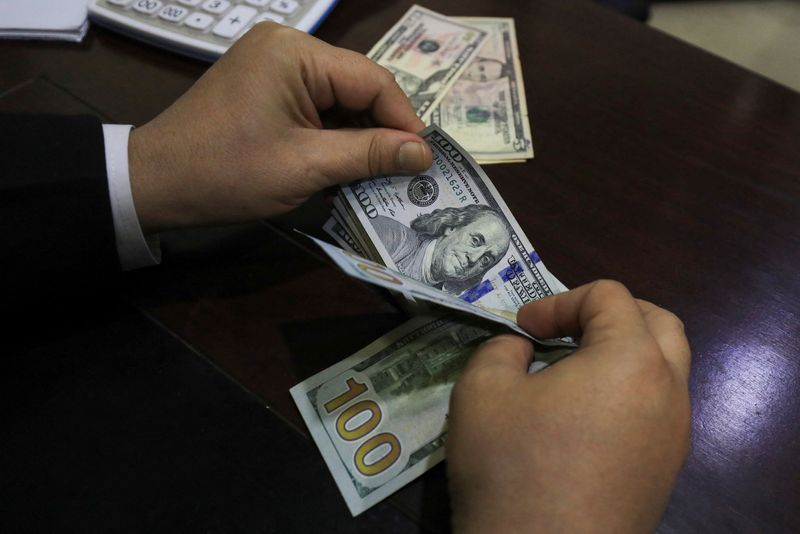
백찬규 연구원은 "미국 금융업종 내 보험산업에 대한 투자심리는 당분간 약화될 수밖에 없다"고 설명했다.
By Ankur Banerjee
SINGAPORE (Reuters) - The dollar hung near its highest in more than two years on Tuesday as traders scale back U.S. rate cuts in 2025 after strong economic data, while investor worries about Britain's fiscal health kept frail sterling in the spotlight.
With President-elect Donald Trump set to step back into the White House next week, the focus has been on his policies that analysts expect will boost growth but add to price pressures.
The threat of tariffs along with the Federal Reserve's stated measured approach to rate cuts this year have lifted Treasury yields and the dollar, putting the euro, pound, yen and yuan under pressure.
Prashant Newnaha, a senior Asia-Pacific rates strategist at TD Securities, said the market's focus now appears to be shifting towards the possibility that U.S. tariffs may be raised gradually.
"The decline in the USD overnight to these headlines suggests that tariffs fears have been baked in," said Newnaha, referring to a Bloomberg report that suggested the Trump administration could take a gradual approach to tariffs.
"And should these headlines persist into Trump's inauguration, it's likely to be see UST yields and the USD head lower with U.S. equities turning higher."
The euro was steady at $1.02475 in early trading but hovering near the more than two-year low of $1.0177 it touched on Monday. The yen was at 157.54 per dollar, inching away from the near six-month low it touched last week.
The dollar index, which measures the U.S. currency versus six other units, was 0.16% higher at 109.59, not far from the 26-month high of 110.17 it touched on Monday.
After a blowout jobs report on Friday reinforced support for the U.S. central bank's cautious stance toward further monetary policy easing this year, investor focus will be on the inflation report due on Wednesday.
Traders are pricing in 29 basis points of easing this year, less than the 50 basis points the Fed projected in December, when it jolted the market with its measured approach to rate cuts due to inflation worries.
U.S. Treasury 10-year yields touched a 14-month high of 4.799%, on Monday in choppy trading before pulling back. It was at 4.7717% in early Asian hours. [US/]
ING strategists said the combination of a stronger dollar and higher Treasury yields is crowding out financial flows to the rest of the world and is starting to cause problems.
"Using the tariff era of 2018-2019 as a template, we expect the dollar to stay strong all year," they said in a note, adding that most important FX market battleground right now is the dollar/yuan – where the PBOC is still managing to hold the line even as depreciation pressure intensifies.
The People's Bank of China (PBOC) has unveiled a flurry of measures to support its weak currency, plans to park more dollars in Hong Kong to bolster the yuan and to improve capital flows by allowing companies to borrow more overseas.
The offshore yuan was last at 7.3465 per dollar in early trading.
The pound has been in the crosshairs of global currency traders with British markets hit by surging bond yields. While higher yields often support the currency, in Britain analysts expect higher borrowing costs may force the government to rein in spending or raise taxes to meet its fiscal rules, potentially weighing on future growth.
The pound last fetched $1.2211 in early trading after hitting $1.21 on Monday, its lowest since November 2023.
The Australian dollar was 0.13% higher on the day at $0.6184, after hitting its weakest since April 2020 on Monday. The New Zealand dollar rose 0.3% to $0.55995, hovering near the two-year low it hit in the previous session.
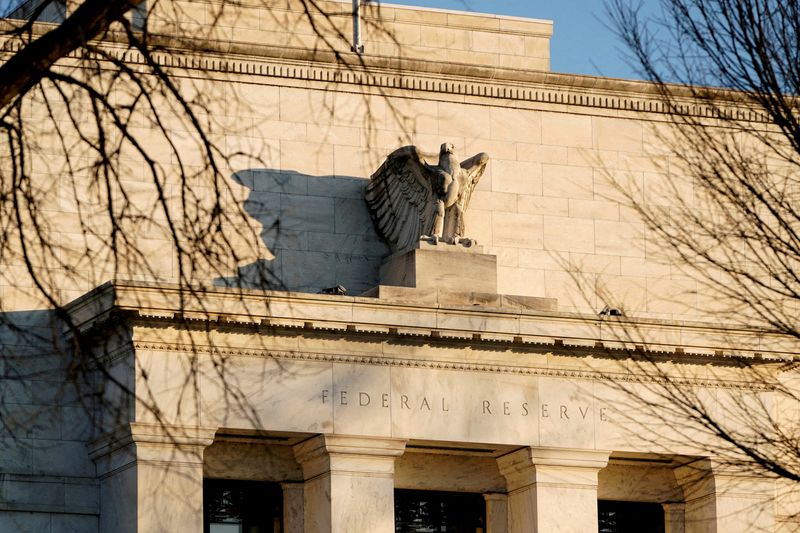
By Chuck Mikolajczak
NEW YORK (Reuters) -The Nasdaq fell on Monday, while the benchmark S&P 500 bounced off a two-month low and eked out a slight gain as U.S. Treasury yields stayed elevated with investors dialing back expectations on the pace of rate cuts from the Federal Reserve.
Recent economic data have indicated a resilient economy with nagging price pressures, which has pressured equities. Comments from Fed officials have pushed bond yields higher. The S&P 500 had weekly losses in four of the last five weeks.
Promised tariffs from President-elect Donald Trump have also fueled worries about inflation.
Treasury yields edged higher, with the benchmark 10-year note yield touching a 14-month high of 4.805% and last up 1.6 basis points to 4.79%.
Markets are pricing in about 27 basis points of cuts from the Fed this year, with a 52.9% chance for a June cut.
"There's concern that we're going to see higher inflation numbers, I'm not so sure that's positively the case, but that's sort of the concern here and that it's going to be a while before we see lower rates again," said Tim Ghriskey, senior portfolio strategist at Ingalls & Snyder in New York.
"The inflation issue is out there and higher yields in general aren't great for either the bond market or really the stock market. You do have out there as well, Jan. 21st coming up and you know and we'll see what the new administration does."
The Dow Jones Industrial Average rose 358.67 points, or 0.86%, to 42,297.12, the S&P 500 gained 9.18 points, or 0.16%, to 5,836.22 and the Nasdaq Composite lost 73.53 points, or 0.38%, to 19,088.10.
The Dow was buoyed by a 3.93% gain in UnitedHealth Group (NYSE:UNH) after President Joe Biden's administration proposed 2026 reimbursement rates for Medicare Advantage plans run by private insurers, which would result in a 2.2% increase in payments.
CVS Health (NYSE:CVS) and Humana (NYSE:HUM) jumped about 7% as the S&P 500 health care sector rose 1.27%.
Utilities and tech led decliners. Edison International (NYSE:EIX) tumbled more than 11.89% after Bloomberg News reported the southern California utility was hit with a lawsuit blaming the company's equipment for igniting one of the wildfires consuming parts of the state.
Energy climbed 2.25%, the biggest daily gain of the 11 major S&P sectors, as crude prices kept rising on expectations that tougher U.S. sanctions on Russian oil would force buyers in India and China to other suppliers.
The Consumer Price Index (CPI) numbers and the central bank's Beige Book on economic activity, both due on Wednesday, will likely help shape views on the Fed's policy outlook.
Chip stocks slipped, with Nvidia (NASDAQ:NVDA) down 1.97% and Micron Tech (NASDAQ:MU) off 4.31% after the U.S. government said it would further restrict artificial-intelligence chip and technology exports. The PHLX semiconductor index was lower.
Moderna (NASDAQ:MRNA) plummeted 16.8% as the biggest decliner on the S&P 500 after slashing its 2025 sales forecast by $1 billion.
Declining issues outnumbered advancers by a 1.02-to-1 ratio on the NYSE, and by a 1.4-to-1 ratio on the Nasdaq.
The S&P 500 posted three new 52-week highs and 23 new lows, while the Nasdaq Composite recorded 23 new highs and 252 new lows.
Volume on U.S. exchanges was 14.88 billion shares, compared with the 15.73 billion average for the full session over the last 20 trading days.
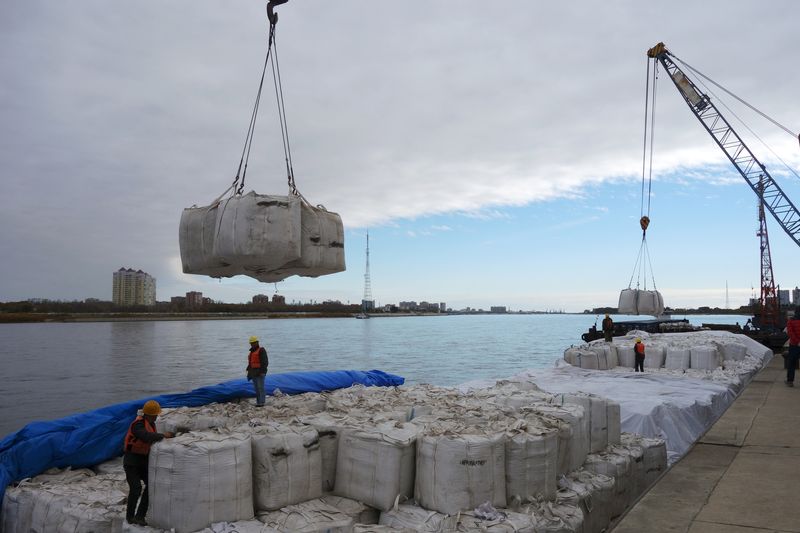
BEIJING (Reuters) - The value of China's imports and exports with Russia reached 1.74 trillion yuan ($237 billion) in 2024, a record high, Chinese customs data showed on Monday, as the two countries' leaders hailed bilateral relations.
China-Russia yuan-denominated trade value grew 2.9% in 2024 from 2023, according to the data by China's General Administration of Customs. The growth was significantly slower than the 32.7% gain in 2023.
Bilateral trade was disrupted by payment hurdles last year after the United States intensified sanctions on banks dealing with Russia, Reuters previously reported.
Russian President Vladimir Putin said in December that the primary challenge to Russia-China trade is mutual payment settlements.
Chinese shipments to Russia in 2024 grew 5.0% in yuan terms from a year earlier, down sharply from the 53.9% gain in 2023, the customs data showed.
Imports from Russia rose 1% last year, slowing from a 18.6% expansion in 2023.
In dollar terms, China-Russia two-way trade value reached $244.8 billion, compared with $240.1 billion in 2023, Chinese customs data showed.
In an exchange of New Year greetings with Putin, Chinese President Xi Jinping said on Dec. 31 that China and Russia have always moved forward "hand in hand" on the right path.
Russia's state-run RIA news agency quoted Moscow's ambassador to Beijing as saying in December that Xi will visit Russia in 2025.
Putin also said last year that bilateral relations had reached a level never seen before, lauding their positive nature.
In December alone, China's exports to Russia grew 6.4% in yuan terms, reversing November's drop, but imports from Russia shrank 4.3% last month.
($1 = 7.3317 Chinese yuan renminbi)

SHANGHAI (Reuters) - Lithium prices are expected to stabilise in 2025 after two years of steep declines as shuttered mines and robust electric vehicle sales in China soak up an oversupply, although the potential for mines to reopen may cap gains, analysts and traders said.
A nearly 86% plunge in prices of the EV battery metal over the past two years from its peak in November 2022 forced companies to mothball mines across the world. But market participants say those closures mean buoyant demand should outpace supply this year as China intensifies policy support to boost sales in the world's largest EV market.
The global lithium supply glut is predicted to shrink by half to around 80,000 tons equivalent of lithium carbonate (LCE) from nearly 150,000 last year, according to Antaike, China's state-owned commodity data provider.
"We expect to see a price recovery for lithium in 2025 as the curtailments seen in 2024, and the possibility of further curtailments, will significantly reduce the market surplus," said Cameron Hughes, battery markets analyst at CRU Group, referring to mine closures without giving further details.
China doubled EV subsidies in July and more than 5 million cars sold as of mid-December had benefited from the incentives.
China's EV subsidies contributed to a lithium price rally late last year, and should continue supporting prices in 2025, three analysts and two traders said.
"The uptick in lithium trade business in the fourth quarter of 2024 can be undeniably attributed to the policy of providing subsidies," a buyer at a mid-sized cathode material plant in China said on condition of anonymity as the buyer was not authorized to speak to media.
Any improvement in prices is likely to be felt towards the end of 2025 as inventories are used up and buyers return to the spot market, said David Merriman, research director at metals research company Project Blue.
Project Blue expects prices to stabilize around an average of $11,092 per metric ton in 2025. Guotai Juan, a Chinese broker, forecasts a price range of 60,000 yuan ($8,184) to 90,000 yuan ($12,276).
The most-traded lithium contract on the Guangzhou Futures Exchange traded between 68,250 yuan and 125,000 yuan per ton last year.
Analysts, however, cautioned that any significant price rise this year is likely to be capped as production can be swiftly scaled up at many closed mines if it proves profitable.
Merriman said that potential U.S. policy changes under the incoming Trump administration, including fresh tariffs on EV battery imports from China or slashing domestic EV incentives, may also pose risks to lithium demand.
($1 = 7.3312 Chinese yuan)
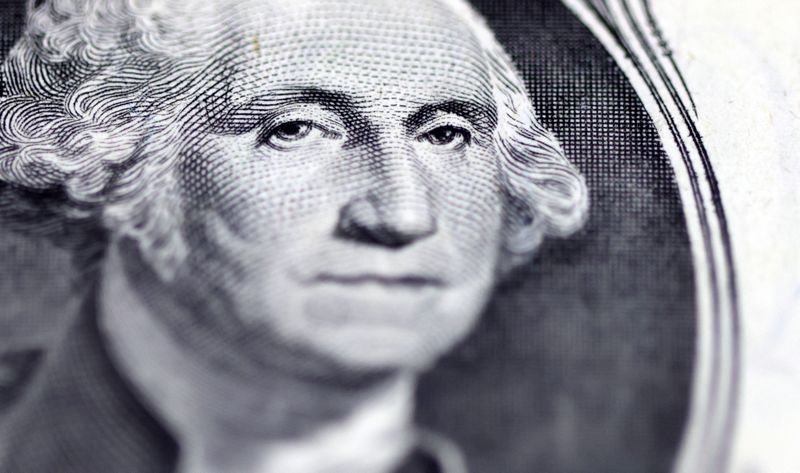
Investing.com-- Most Asian currencies weakened on Monday, seeing sustained pressure from strength in the dollar as stronger-than-expected U.S. payrolls data fueled increased expectations that interest rates will fall at a slower pace in 2025.
Regional trading volumes were somewhat muted on account of a Japanese market holiday, although the yen also remained largely fragile along with its regional peers.
Positive Chinese trade data did little to improve regional sentiment, with the yuan remaining fragile despite efforts from the People’s Bank to support the currency.
Dollar at 24-mth high on strong payrolls data
The dollar index and dollar index futures drifted higher in Asian trade after hitting their strongest levels since November 2022 on Friday.
The greenback was boosted chiefly by stronger-than-expected nonfarm payrolls data for December, which showed the U.S. labor market remained strong.
The reading tied into heightened concerns that a strong labor market and sticky inflation will give the Federal Reserve even more impetus to cut interest rates slowly this year.
To that end, consumer price index inflation data is due this Wednesday and will be closely watched for more cues on interest rates.
A string of Fed officials are also set to speak this week, after the minutes of the Fed’s December meeting showed growing concerns over high inflation and labor market strength among policymakers.
Goldman Sachs analysts said that they now expected only two interest rate cuts in 2025, compared to prior expectations of three cuts. The Fed’s terminal rate is also expected to be higher than initially expected.
Chinese yuan weak despite positive trade data, PBOC support
The Chinese yuan weakened on Monday, with the USDCNY pair rising 0.3%.
Weakness in the yuan came even as data showed China’s trade balance grew more than expected in December, aided by outsized exports.
But the reading was largely tied to exporters front-loading their shipments ahead of U.S. President-elect Donald Trump imposing steep trade tariffs on the country.
Trump- who will take office on January 20- has vowed to impose tariffs on China from “day one” of his presidency.
Recent measures from the PBOC did little to support the yuan. The central bank paused its bond buying liquidity programs, and also set a series of strong midpoint fixes.
Focus is now on more stimulus measures from Beijing, especially in response to Trump’s tariffs.
Broader Asian currencies moved in a flat-to-low range, remaining pressured by the prospect of higher for longer U.S. interest rates.
The Japanese yen’s USDJPY pair fell 0.1%, remaining quashed by uncertainty over a Bank of Japan meeting later this month.
The Australian dollar’s AUDUSD pair rose 0.1% after slumping to a near five-year low last week. The South Korean won’s USDKRW pair fell slightly, while the Singapore dollar’s USDSGD pair rose 0.1%.
The Indian rupee’s USDINR pair steadied after hitting fresh record highs above 86 rupees.

